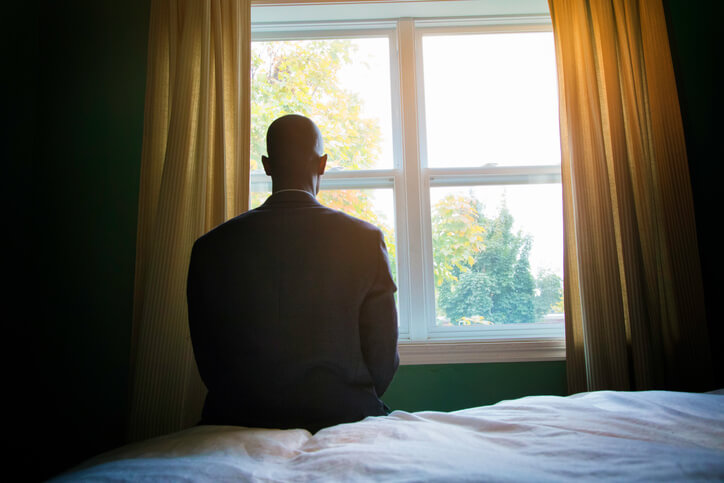
Can Loneliness Cause Adverse Health Effects — Even Death?
[cs_content][cs_section bg_color=”hsl(0, 0%, 100%)” parallax=”false” separator_top_type=”none” separator_top_height=”50px” separator_top_angle_point=”50″ separator_bottom_type=”none” separator_bottom_height=”50px” separator_bottom_angle_point=”50″ style=”margin: 0px;padding: 45px 0px;”][cs_row inner_container=”true” marginless_columns=”false” style=”margin: 0px auto;padding: 0px;”][cs_column fade=”false” fade_animation=”in” fade_animation_offset=”45px” fade_duration=”750″ type=”2/3″ style=”padding: 0px;”][x_custom_headline level=”h1″ looks_like=”h1″ accent=”false”]Can Loneliness Cause Adverse Effects on Your Health — Even Death?[/x_custom_headline][cs_text]Written by Dr. Larry
[dropcap]T[/dropcap]here is something I’ve been reading and researching that surprised me, almost shocked my M.D., to be honest. It’s something I want you to discuss with you.
Loneliness.
And its effect on your health.
Here are some of the surprising studies I’ve come across.[/cs_text][x_video_player type=”16:9″ src=”https://www.youtube.com/watch?v=gevjdcLn0Rg&t=8s” hide_controls=”false” autoplay=”false” no_container=”false” preload=”none” advanced_controls=”false” muted=”false” loop=”false” poster=””][cs_text]
In one study, researchers compared smoking, high blood pressure, high cholesterol and loneliness in terms of risk of death. Which one do you think was the worst? Smoking — we know this, right? Don’t smoke. What about No. 2? It wasn’t high blood pressure or high cholesterol; it was loneliness. And it was almost as bad as smoking.
In other words, this new kid on the block, loneliness, is worse than the high blood pressure and high cholesterol that I’ve studied and treated for over 15 years of training and practice! This is a big deal!
Let’s keep going.
One study looked at social isolation and found an increase in blood pressure and CRP in the blood, a marker of inflammation. That is to say, we were able to put numbers to it and connect the dots with two things — high blood pressure and inflammation — that are known to cause disease.
Another study demonstrated that loneliness activates inflammation at the genetic level — by turning on inflammation genes and turning off anti-inflammation genes in a way that is not explained by cortisol (the stress response hormone did not account for this inflammation), depression, income or race. In other words, loneliness itself seems to directly trigger the disease process itself.
Loneliness has been predictive of depression, impaired sleep, worse mental function, and death.
At the physiological level, it is associated with not only inflammation and increased blood pressure (as we noted above) but increased stress response and lower immunity.
Here’s the final kicker. When it came to loneliness increasing blood pressure, the association was not accounted for by depression, stress or low social support. That is to say, even when someone is not depressed, stressed and has good social support, loneliness can still make their blood pressure go up.
I’m trying to make an argument to you: Loneliness itself is a risk factor and possible causative agent of disease.
Now as a doctor and scientist, I recognize that statement is pushing it. Might be a bit much. “More research is indicated” kind of thing.
But, because I’m a doctor who has seen the spectrum of patients — from billionaires to the poorest of the poor in the U.S., Haiti and Africa — it would not surprise me at all that social isolation kills, and social connection and relationships are good for health, longevity and happiness.
This is just the beginning of this conversation I want to have with you. This affects everyone, but I especially see loner men and want to reach out to them. Whether that’s you or a potentially lonely man in your life, we have two questions that I will get to on another blog.
- What can you do to combat loneliness for yourself and go the other direction?
- What can you do for others who may be experiencing loneliness themselves?
Let’s keep this conversation going.[/cs_text][x_gap size=”50px”][/cs_column][cs_column fade=”false” fade_animation=”in” fade_animation_offset=”45px” fade_duration=”750″ type=”1/3″ style=”padding: 0px;”][x_widget_area sidebar=”sidebar-main” ][x_widget_area sidebar=”ups-sidebar-adoption-services” class=”man”][/cs_column][/cs_row][cs_row inner_container=”true” marginless_columns=”false” style=”margin: 0px auto;padding: 0px 0px 30px;border-style: solid;border-width: 1px;”][cs_column fade=”false” fade_animation=”in” fade_animation_offset=”45px” fade_duration=”750″ type=”1/1″ style=”padding: 0px;”][cs_text]
Featured Content
[/cs_text][/cs_column][/cs_row][/cs_section][cs_section parallax=”false” separator_top_type=”none” separator_top_height=”50px” separator_top_angle_point=”50″ separator_bottom_type=”none” separator_bottom_height=”50px” separator_bottom_angle_point=”50″ style=”margin: 0px;padding: 20px 0px 0px;”][cs_row inner_container=”true” marginless_columns=”false” style=”margin: 0px auto;padding: 0px;”][cs_column fade=”false” fade_animation=”in” fade_animation_offset=”45px” fade_duration=”750″ type=”1/1″ style=”padding: 0px;”][ess_grid alias=”featured_content”][/cs_column][/cs_row][/cs_section][/cs_content]

